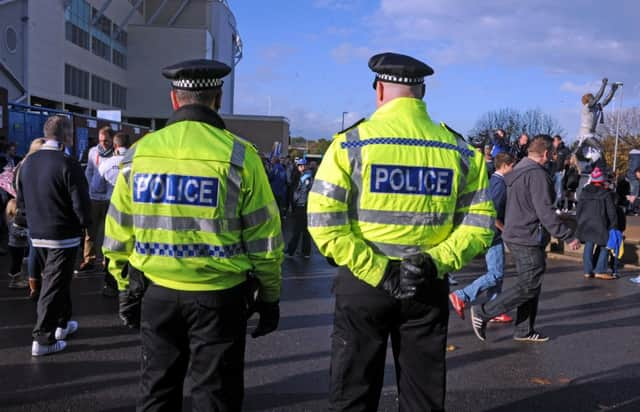How much football clubs pay for policing - and why Leeds United set the benchmark


The five teams under the Metropolitan Police’s jurisdiction - Arsenal, Chelsea, Crystal Palace, Tottenham and West Ham - were charged a combined £178,047 for policing the areas inside and immediately outside stadiums controlled by the clubs in the 2015-16 campaign.
By contrast Manchester City had the biggest policing bill, paying Greater Manchester Police £944,195.01 over the same period, with city rivals United second out of the 20 clubs with a charge of £925,126.61.
Advertisement
Hide AdAdvertisement
Hide AdA Freedom of Information request was made by the Press Association to all 12 police forces which had responsibility for at least one Premier League club during the 2015-16 season to disclose the amount charged to those clubs for policing over that period. The forces were also asked to disclose the risk categories associated to each fixture played by those clubs.
Chelsea paid the most of the London clubs but the total charge from the Met to the club was just £94,388, just under 10 times the amount paid by Manchester City. Tottenham paid £38,568, Arsenal paid £32,536, West Ham paid £12,555 and Palace paid nothing at all because there was no police presence at all at their matches at Selhurst Park.
The difference between Chelsea and Manchester City’s season costs is almost £850,000 - which equates to just under four weeks’ wages for City’s star striker Sergio Aguero at a reported £220,000 per week.
We spoke to Assistant Chief Constable Mark Roberts of Cheshire Police, the National Lead for football policing, to get some context on how policing at football is charged.
What can police forces charge for?
Advertisement
Hide AdAdvertisement
Hide Ad“Forces are guided by case law, in particular the case between Leeds United and West Yorkshire Police, which stipulated that forces could only charge on areas owned, leased or controlled by the club. That case law really sets out the extent to which we can charge and that will vary according to the geography of the stadiums. If the stadium is right onto a public highway then that in effect is public land and police wouldn’t normally be able to charge for it.”
How is the charging calculated?
“You would generally have a discussion about risk grading at the start of the season - a Manchester derby for instance would be high risk (Category C Increased Risk), whereas a game for one of the Manchester clubs against, say, Fulham, might be a Category A, or even police-free or spotters only. You can vary it bit by bit as the season goes on, as the risk category can go up or down.
“I encourage forces to have a signed agreement with their clubs before the start of the season because what you don’t want are disputes arising part way through and then you can have arguments about whether people are going to police a particular game or not and it gets very difficult for all concerned.”
When are the charges paid?
“Normally, the policing fees are paid game by game.”
Have there been any disagreements over this recently?
“There’s been a case between Suffolk Police and Ipswich Town, where there was a road outside the stadium which was closed off by the club on a match day for people to queue, sell programmes and where concessions were placed. The view of the High Court was that in effect that the road should be treated in the same way as the area inside the stadium was, and ruled that the police were allowed to charge for that area as well.”
Advertisement
Hide AdAdvertisement
Hide AdShouldn’t wealthy Premier League clubs be contributing to policing in some public areas on match days anyway?
“We are still in effect subsidising football because you have got to put additional policing on. Police forces are smaller and every police officer that you put on a football match isn’t available to look for burglars, deal with other sorts of offenders, etc. So there is a broader cost to the public in that we are taking people away from core duties to be able to allow a football match to carry on.”
How could that situation change?
“We constantly keep it under review and we would always have a discussion with the Home Office to see if there is an appetite to review it. But the fact of the matter is we do have to provide resources to make sure people can get to and from the grounds in safety and minimise the disruption to local communities. That’s a fact of life. I think people take a view whether it’s fair or not.
“I think there is a potential for clubs to make a greater contribution but for that to change it would require a change to legislation and I don’t sense any great appetite to change those arrangements.”
Are the increased number of televised games a problem?
Advertisement
Hide AdAdvertisement
Hide Ad“We have had a really good dialogue with the Premier League of late. There were some wranglings over a Merseyside derby which was a late kick-off for TV, but we’ve had some sensible discussions over the last couple of years and highlighted those games which we really would like to avoid being a late kick-off to avoid the risk of all-day drinking and diverting resources away from normal Saturday evening policing duties.”